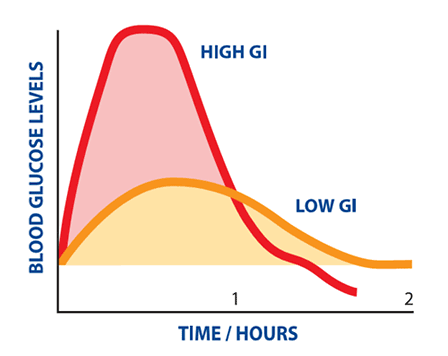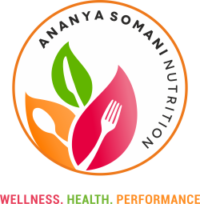Polycystic ovarian syndrome (PCOS) is an endocrine condition that affects women of reproductive age. Common signs and symptoms include irregular menstruation, excessive androgens and hirsutism (excess body and facial hair), and the presence of cysts on the ovaries. It can also be associated insulin resistance, heart disease, psychological features and unfortunately there is no cure for it at present. However, there is unequivocal evidence that food, exercise and overall lifestyle habits can help manage the symptoms experienced.
Food strategies
Do you have to cut out carbohydrates, gluten or dairy?
Carbohydrates are an easy target because insulin resistance is common in women with PCOS and could even be the underlying cause. Essentially, insulin resistance means that insulin levels increase as more insulin is required to absorb the carbohydrate consumed, leading to poor blood sugar control. However, rather than eliminating carbohydrates from one’s diet completely, it is suggested to be mindful of the quality and quantity of carbohydrates. Specific suggestions are provided below.
Meanwhile, when it comes to gluten and dairy, it’s a matter of individual tolerance. There is no current evidence or recommendation that eliminating gluten or dairy is necessary for management of PCOS. In fact, one must plan their diet to ensure nutritional adequacy if such foods need to be limited, as they provide essential micronutrients such as calcium and various B vitamins.
Top 3 nutrition tips:
- An overall healthy eating pattern, along the lines of the Mediterranean diet can be beneficial. The basic tenets of such a diet are:
Rich in: Wholegrains, Fruits, Vegetables, Lentils & legumes, Olive oil, Nuts & seeds
Low to moderate in: Sugar, Red meat, Poultry and Dairy
- Low glycemic index carbohydrates are those that don’t spike the blood sugar levels rapidly. It has been suggested to prioritise these foods (e.g. pulses, wholegrains, millets, vegetables etc) in the diet to help manage insulin resistance that can be associated with PCOS.

Notably, the glycemic index of a meal can also be managed by pairing it with protein, fibre and/or healthy fats. For instance, adding plenty of sabji and a portion of dal/chicken with roti at a main meal.
- Weight loss
Weight loss may help manage symptoms. However, this is NOT a blanket rule because the overall lifestyle habits matter and if weight loss occours as a bye-product of improving these it is likely more beneficial than chasing weight loss for the sake of it.
There is no one-size-fits-all approach when it comes to PCOS and individual factors need to be considered in planning nutrition strategies to help manage the symptoms. Specific supplements may also be of benefit, look out for a future post to address those!
References:
- Barrea, L., Marzullo, P., Muscogiuri, G., Di Somma, C., Scacchi, M., Orio, F., Aimaretti, G., Colao, A., & Savastano, S. (2018). Source and amount of carbohydrate in the diet and inflammation in women with polycystic ovary syndrome. Nutrition research reviews, 31(2), 291–301. https://doi.org/10.1017/S0954422418000136
- Escobar-Morreale H. F. (2018). Polycystic ovary syndrome: definition, aetiology, diagnosis and treatment. Nature reviews. Endocrinology, 14(5), 270–284. https://doi.org/10.1038/nrendo.2018.24
- Farshchi, H., Rane, A., Love, A., & Kennedy, R. L. (2007). Diet and nutrition in polycystic ovary syndrome (PCOS): pointers for nutritional management. Journal of obstetrics and gynaecology: The Journal of the Institute of Obstetrics and Gynaecology, 27(8), 762–773. https://doi.org/10.1080/01443610701667338
- Teede, H. J., Misso, M. L., Deeks, A. A., Moran, L. J., Stuckey, B. G., Wong, J. L., Norman, R. J., Costello, M. F., & Guideline Development Groups (2011). Assessment and management of polycystic ovary syndrome: summary of an evidence-based guideline. The Medical journal of Australia, 195(6), S65–S112. https://doi.org/10.5694/mja11.10915


Pingback: Supplements for PCOS – Ananya Somani Nutrition